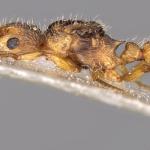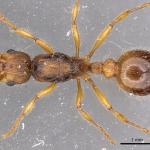Myrmica hirsuta is a very rare social parasite mainly of Myrmica sabuleti. Queens and males are very similar to M. sabuleti but smaller, more robust and hairier. Myrmica hirsuta queens can be separated from microgynes of their host by an enlarged post-petiole, wider frons and longer body hairs. Small numbers of M. hirsuta workers are sometimes present in nests. Parasitised nests produce alates of both parasite and host.
Southern England with a single record for West Wales.
Has been recorded in Central and Northern Europe including Finland to 60° North.
Shirt (1987) listed this species as Rare (RDB3), a status revised to Insufficiently Known (RDBK) by Falk (1991).
Warm grassland sites where its hosts' nests are found.
Alates can be found in nests from mid July and they fly from mid August to early September.
M. hirsuta is an obligatory social parasite and after the nuptial flight mated queens are able to spend the winter under stones and find a host colony the following Spring.
Relies on host workers for food.
2019



